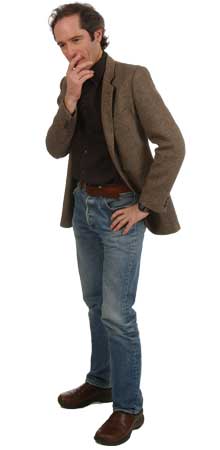CU Law Profiles
Faculty
Profile

Pierre Schlag
Jurisprudence, Constitutional Law, Torts
You may also visit my faculty home page.
Hometown
The Liege, Belgium-Los Angeles Axis
Hobbies, Sports, or Extracurricular Passions
Backpacking, skiing, bicycling, carpentry, novels
Favorite Book
Right now? Saturday by Ian McEwan
Favorite Movie
Chinatown, Apocalypse Now, Schindler's List
What were you doing before you came to the University of Colorado Law School?
I was teaching at the University of Puget Sound Law School (now Seattle University). Before that I worked at Covington & Burling in Washington D.C. doing tax, antitrust, and a lot of pro bono work (mostly constitutional law).
What is one interesting, fun, or offbeat thing you have done in your lifetime?
Working as a volunteer firefighter.
What do you consider to be one of your biggest accomplishments?
My children, Nick, Kate, and Zoe.
What do you like most about Boulder?
Living in the foothills. Plus all the trails.
What do you like least about Boulder?
The wind. I hate it.
Favorite Place To Eat Out in Boulder
Aji
Why did you decide to become a professor?
Congenital condition
What do you like most about teaching at CU?
The students--truly nice people. That and the small classes.
What area of law are you most interested in and why?
I like what other people generally call "theory" which to me is actually quite a practical subject. Once you learn to recognize the patterns that organize law and legal thinking, you realize that neither is nearly as complicated as it appears to be. What's more, "theory" allows you to take some distance from the enterprises of law, to retain some moral and political perspective on law. It allows a sort of critical running conversation on what legal actors are doing (or think they are doing).
What piece of advice would you give a student about surviving being a 1L?
It's all about two things. 1) yes, it's really about "thinking like a lawyer" (I won't go into that.) 2) it's also about information management. First year, at every law school, gives you way too much in the way of information. The question is: how will you organize all this information?
What piece of advice would you give a student about getting the most out of law school?
Get to know your professors. Form study groups. Hang out after class. (The conversation after class, out in the hall, is often really interesting.)
What piece of advice would you give a 1L or 2L as they choose their 2L and 3L courses?
Branch out. Take some weird courses. Take courses from professors who help you learn the best. Resist taking courses simply because they're on the bar exam.
What are the top three reasons that you think a prospective student should choose CU Law?
1. The faculty. 2. The students. 3. Boulder
What piece of advice would you give a prospective student about choosing a law school?
Go visit. Talk to the students at the law schools. Get the feel of the place. You're going to spend three years in fairly intense proximity to other students. They ought to be people you like and who will add to your life.
Could you describe each of the main classes that you teach, and give your explanation of what those classes are about?
Torts: As this is a first semester course, we spend a fair amount of time learning to read cases and practicing some fairly basic operations of legal reasoning and legal interpretation. Soon, however, the class turns to issues of policy, fact characterization, and rhetoric. The thing that's great about torts is that everyone in the class pretty much understands the nature of the transactions (i.e. accidents, medical malpractice, product injuries, etc.). That shared background allows us to move fairly quickly to interesting questions about basic legal ideas such as duty, causation, and the nature of wrongs.
Jurisprudence: All about the recursive patterns and conflicts that shape American law.
Constitutional Law: The piece de resistance in American legal thought. An opportunity to encounter the great struggles and mythic ideals of American legal and political life through the artifacts of Supreme Court opinions.